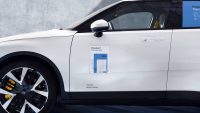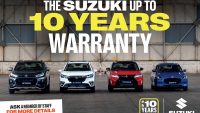At least 22 per cent of the cars manufacturers sell next year will have to be electric – or they could face fines of up to £15,000 per car they miss their target by.
That’s if the latest government proposals get the go ahead. Ministers have today announced proposed new targets as part of a major green agenda which details tough goals and punitive measures for car makers.
A credits based system will allow manufacturers to trade EV tokens between each other if they think they are going to miss their targets.
Manufacturers selling fewer than 2,500 cars a year would be exempt, but under the proposals other makers will be able to ‘freely trade’ allowances with other car firms ‘for any price’ if they exceed their EV mix until 2026.
This will allow EV specialists like Tesla and Polestar to cash in by selling their additional credits earned over the set allowances.
Car makers unable to meet their targets, even with credits, will be fined, with the government proposing a £15,000 penalty for every non-electric car and £18,000 per non-electric van they miss their target by.
The percentage of EVs each car maker has to sell each year will continue to rise between now and 2030 when internal combustion engined cars will be banned.
In 2024, each car manufacturer must have a 22 per cent share of EVs – the current average EV mix in the market is 19.1 per cent (year to date), increasing to 80 per cent by 2030.
- More car dealers holding off buying used EVs as prices plummet
- Electric cars dominate top 10 biggest fallers list in March
For new vans, the government wants to see a 10 per cent EV mix among manufacturers in 2024, rising to 70 per cent by 2030. Plug-in hybrids will still be allowed until 2035.
Technology and decarbonisation minister Jesse Norman said: ‘As today’s announcements show, the government is doing more than ever to help the UK move away from petrol and diesel and towards electric vehicles.’
Industry body the SMMT wasn’t too impressed with the announcement.
Chief executive Mike Hawes said: ‘Automotive is on track to deliver zero emission motoring, so we welcome this long-awaited consultation on a watershed regulation for the UK new car and van market.
‘We want regulation that gives consumers choice and affordability, and enables manufacturers to transition sustainably and competitively.
‘While the proposals rightly reflect the sector’s diversity, late publication and lack of regulatory certainty make product planning near impossible, and the continued lack of clarity as to what technologies will be permitted beyond 2030 undermines attempts to secure investment.’
In today’s announcement there was no mention of following the EU’s proposals of allowing vehicles to run on e-fuels after 2035.
To qualify as a ‘ZEV’ or zero-emissions vehicle – the term the government uses – the government said cars must ‘emit no CO2 at the exhaust’ and have a ‘minimum range of 120 miles’.
Car Dealer reported earlier today that Vertu Motors boss Robert Forrester told Radio 4 he thought e-fuels were a ‘great unknown’ for the industry.
The EU reached an agreement on March 28 to allow combustion engines running on e-fuels (gas or liquid-form substances that are created from renewable sources) in EU countries after its 2035 deadline to phase out traditional combustion engined cars.
Ferrari and Volkswagen both spoke out to welcome the EU decision earlier this week.
However, the UK government’s 56-page consultation document contains no mention of ‘e-fuels’.
Ginny Buckley, founder of Electrifying.com, said she was pleased the government was ‘pressing ahead’ with its plans.
She said: ‘In recent months, it seems some manufacturers who haven’t made the investment in electric powertrains have been trying to change the rules around the 2030 petrol and diesel ban.
‘This isn’t fair on others who have been working towards this for some time now, so I’m pleased to see the government isn’t succumbing to pressure from those who haven’t done their homework.
‘In any case, we’re moving in the right direction by pressing ahead with plans and not watering down the rules like our European counterparts, who seem to be using inefficient e-fuels as a distraction.’
Also welcoming the news was the British Vehicle Rental and Leasing Association which said it was also pleased the government was pushing ahead with its plans.
BVRLA chief executive Gerry Keaney said: ‘In sticking with its 2030 Phase-Out target for new ICE vehicle sales and providing a clear trajectory, the government has delivered essential clarity and certainty for the fleet and mobility services sector and its supply chain.
‘The ZEV mandate is a critical tool in the UK meeting its ambitious Net Zero targets. The clarity given today will give fleets and motorists the confidence to continue their decarbonisation journey and accelerate the transition to zero emission transport.’
The government also pledged to invest almost £400m into improving the UK’s struggling charging network in its announcement today.
Ministers launched a £381m Local Electric Vehicle Infrastructure fund in a bid to help motorists go green. It will work in tandem with the £15m On-Street Residential Charging Scheme to help bankroll the installation of tens of thousands of new chargers across the country.
Additional reporting: Ted Welford, PA



































